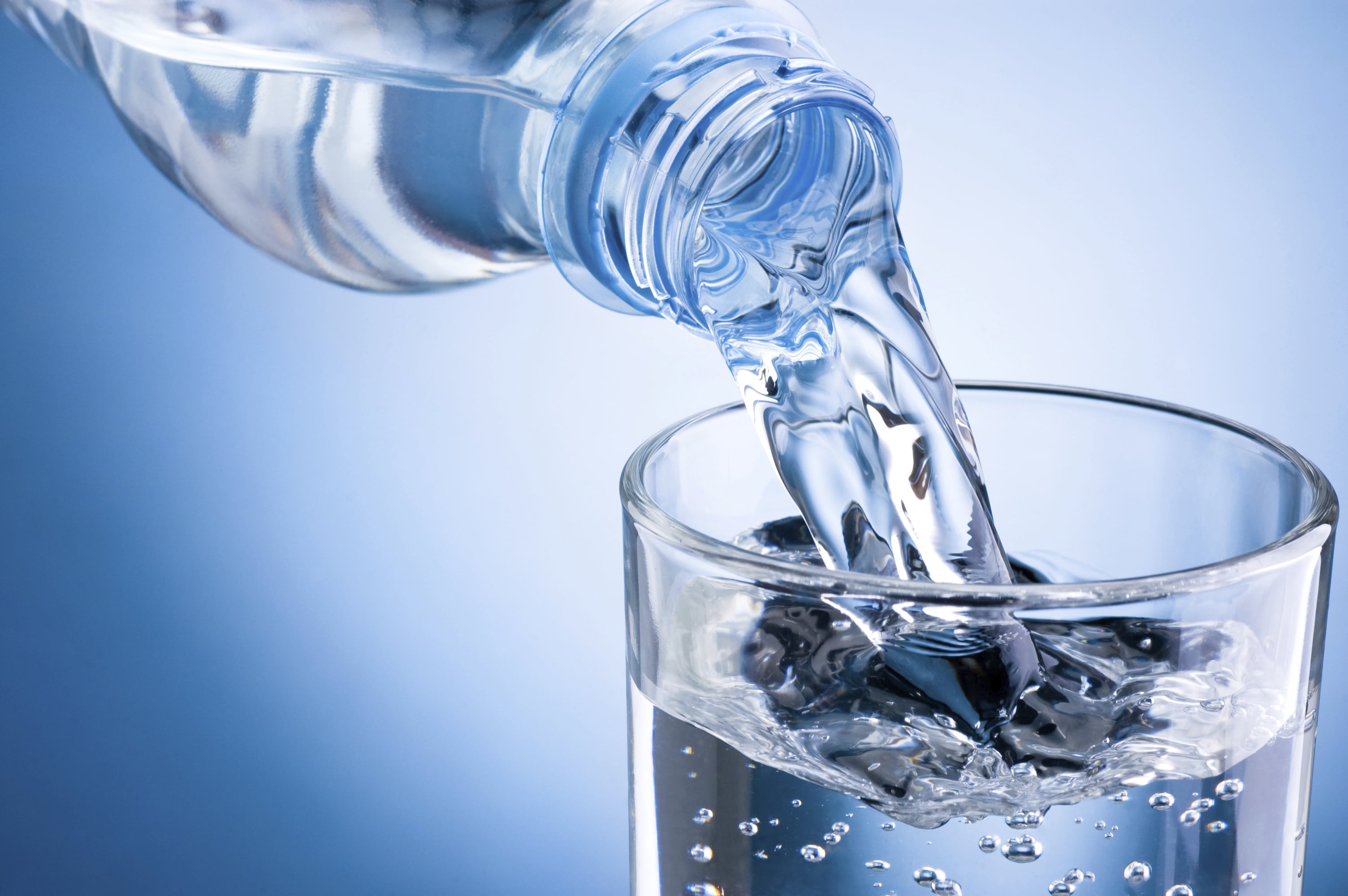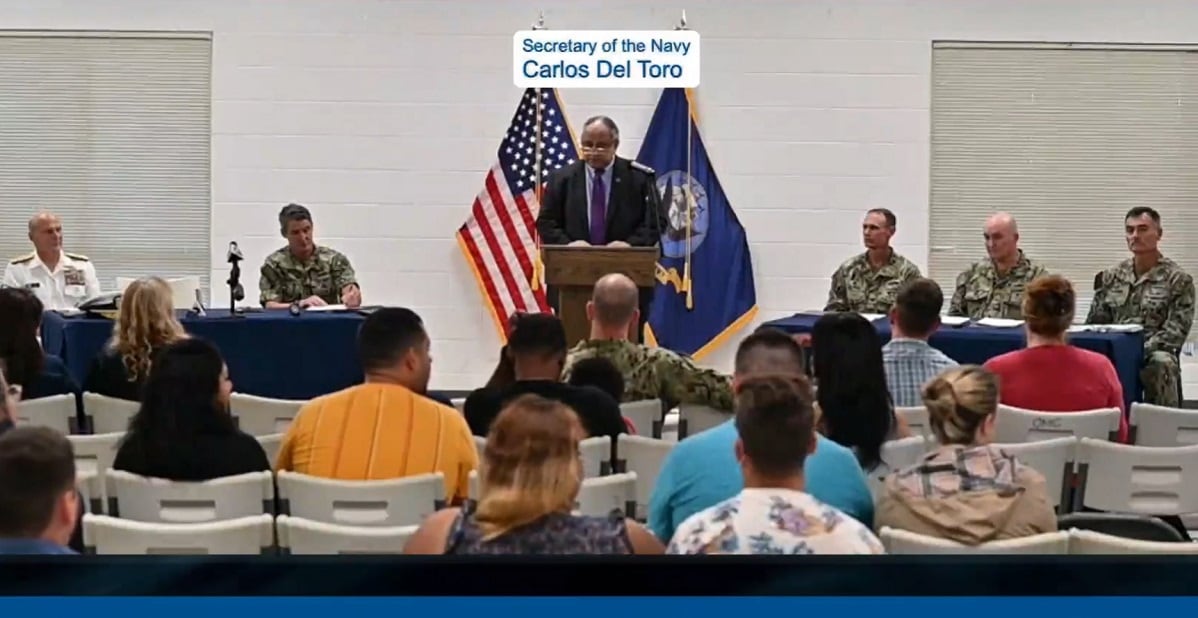After hearing from pregnant women, nursing mothers and parents of children with rashes, stomach problems and other illnesses they believe are related to petroleum found in the Navy water supply in Hawaii, Secretary of the Navy Carlos Del Toro apologized to Hawaii military families and pledged during a town hall meeting Sunday to fix the problem.
“I apologize to each and every one of you for the angst that we have caused you,” Del Toro said. “All I can do moving forward is try to fix the problem.”
The SecNav and Chief of Naval Operations Adm. Mike Gilday attended the town hall and stayed for two hours. Other Navy leaders, including Rear Adm. Blake Converse, deputy commander of U.S. Pacific Fleet, continued to field questions for another two hours.
Del Toro said he plans to make concerns of pregnant women a top priority and will direct the Navy surgeon general to set up a separate hotline for those who are pregnant to answer their questions and concerns. He also will ask the surgeon general to provide information for nursing mothers, who have been unable to get answers on whether they should continue to nurse their babies given the ingestion of fuel-tainted water.
“My promise to you is we don’t just leave here and forget about you,” Del Toro said, noting that he has been meeting with his staff every day since being notified of the problems Nov. 29 and is “bringing to bear” every possible Navy resource to address the problem. That includes finding the root cause of the problem and fixing the long-term problems throughout the Navy’s water system in Hawaii, he said.
Del Toro traveled to Hawaii because of Pearl Harbor commemorations, but said being at the town hall “is the most important thing that I can be doing,” noting that the families’ safety is more important to him than anything else.
During the four-hour town hall, leaders faced tough, emotional questions from families from all service branches about the source of the contamination, why families weren’t notified earlier about possible contamination, and why officials didn’t go door to door to notify them. They have been presented with conflicting information at times, and many families still are unclear about whether it’s safe to use their water.
There have also been discrepancies in how the different service branches have been handling services for families, with praise going to the Army for essentially deploying soldiers from the 25th Infantry Division to deliver water door to door and setting up a variety of other helpful services in their housing area at Aliamanu Military Reservation, which gets its water from the Navy system. The Navy has also set up a family assistance center, and has water stations, but isn’t bringing water door to door to residents.
A number of families first began to smell fuel in their water on Nov. 28. But for about a week before that, they were experiencing unexplained rashes, gastrointestinal problems, headaches and a variety of other issues.
Officials said they have now identified three Air Force housing communities, five Navy communities and two Army communities affected by the contamination. Within Joint Base Pearl Harbor-Hickam, there are about 7,000 housing units for families of all the services. Of those, about 1,400 are in areas that have been affected by these water issues, said Chuck Anthony, spokesman for the joint base. About 600 residents of base housing had asked for testing as of Thursday.
Families are fearful for their children’s health right now, and they’re concerned about long-term effects. Pets and service dogs have been suffering, and some families said they were forced to put them down.
“I’m here to ask why you were not a wingman to protect my 13-month-old son when I was bathing him and I was giving him a sippy cup full of water from my faucet, when he was throwing up for days on end,” said one Air Force wife who questioned why officials didn’t tell families sooner not to drink or use the water, especially in light of earlier fuel leaks.
“I’m here to ask why you were not my wingman as my husband and I have had mysterious symptoms” such as sore throats, headaches that couldn’t be stopped, vomiting, diarrhea, skin irritations and gastrointestinal problems, she said. Those problems led to multiple visits to the emergency room.
“I’m here to ask why you weren’t there protecting my family when we made the heartbreaking choice to put my beloved dog down,” she said.
The family spent thousands of dollars to discover why their healthy dog was suddenly coughing, choking, vomiting, had difficulty breathing, lost its appetite, became weak, had intermittent dry and oily feces, lack of coordination, head tremors and dehydration.
“It now makes sense why she would seemingly go days without drinking water and then vomit after drinking,” the wife said. “I dare say you murdered my dog, but causation is not correlation, so I’m left to speculate.”
Now that the problems have received national media attention, she said, “I ask that you fix this and fix this honestly. And I implore you to let us know how long we’ve been exposed so we can take precautions for the coming years and decades.”
“My husband has gladly and readily served his country,” she said. “I’ve stood by his side and stood up for this community on a number of occasions, as a key spouse, a friend and mentor to other spouses and service members, and I had wrongly assumed that this leadership would be doing the same for us daily.”
She cited information from the Environmental Protection Agency that daily ingestion of such products can result in damage to the central nervous system, liver, kidneys, heart, lungs and other vital organs, and asked why officials told families the water was safe to drink and use.
Initial Navy tests didn’t indicate the presence of fuel in the water samples, but officials sent the samples to the mainland for more extensive testing. Results came back positive on Dec. 3 for petroleum products in the Red Hill well, which the Navy shut down Nov. 28 after the reports began. Hawaii Department of Health officials also announced Dec. 1 that a test at Red Hill Elementary School came back positive for petroleum products.
Officials are now trying to pinpoint the type of fuel product. Asked if the problem could be sabotage, Capt. James Meyer, commander of Naval Facilities Engineering Systems Command Hawaii, said they don’t see that as likely, but aren’t ruling anything out right now.
RELATED

Army and Navy officials have provided alternate lodging for families; the Army is providing it through contracted hotel rooms, and Navy is providing contracted hotel rooms as well as a process for a temporary lodging allowance and compensation for expenses.
Converse, leader of the crisis action team formed to deal with the water problems, said there isn’t yet an estimated timeline when the issues will be resolved but that a timeline should be available in the next couple of days.
The goal is to get everybody back in their homes before the holidays, he said, but added he couldn’t guarantee that. A number of experts have been brought in, including Army Corps of Engineers specialists, to help them finalize their plan for safely ridding the water of petroleum contaminants.
Concerns were raised that some families may still be drinking and using the water.
One military wife whose husband is deployed said she had been drinking the water and showering twice a day until her husband’s first sergeant contacted her two days before the Dec. 5 town hall. She had COVID last year, she said, and can’t smell. She’s not on social media and wasn’t aware of the issues, she said. Now she’s sick with stomach cramps and a rash. With two dogs, it’s difficult for her to get a hotel room. She’s also having to eat out every single day.
Karen has covered military families, quality of life and consumer issues for Military Times for more than 30 years, and is co-author of a chapter on media coverage of military families in the book "A Battle Plan for Supporting Military Families." She previously worked for newspapers in Guam, Norfolk, Jacksonville, Fla., and Athens, Ga.




